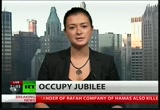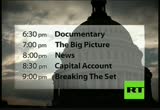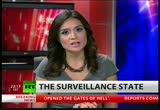tv [untitled] November 14, 2012 4:00pm-4:30pm EST
4:00 pm
see i'm rolling through u.s. consumer debt as only the occupy movement protesters are buying of death for pennies on the dollar and then forgiving as some call it an ingenious idea others a disaster waiting to happen we'll debate the effectiveness of this program straight ahead. plus sacks of lies and the surveillance state the more this is a trade a scandal unfolds the more curious this case becomes thought beyond a made for t.v. sex drama we'll tell you why this story matters for your internet privacy and what it says about the state of surveillance in the u.s. .
4:01 pm
it's wednesday november fourteenth four pm here in washington d.c. i'm liz wall and you're watching. well how do you feel about bailing out the people instead of the big banks well that's what a spinoff of the occupy wall street of occupy wall street is on a mission to do what's called the rolling jubilee and it's catching the attention of journalists and the finance sector it's being both hailed and scrutinized here's the organization's explanation of it. we shouldn't be forced into debt to cover basic needs like health care housing and education we need a jubilee a clean slate a cancellation of debts from the ninety nine percent here's how we're going to do it in america banks so that on this show how do we market full of debt buyers debt collectors then turn around and try to extort the full amount from us that's where
4:02 pm
the rolling jubilee comes and that raises money to buy that but instead of collecting on the debts we buy we're going to abolish. the map is on our side a little bit of money goes a long way if we can raise fifty thousand dollars we can buy a million dollars worth of debt and abolish it if we raise more we can abolish even more. so as you just heard the idea behind this jubilee is to buy distressed debt for pennies on the dollar and then forgive it it's kind of what the big banks do except now it's a group of ordinary citizens buying and selling the debt the bad debt and then bailing out the people rather than banks too big to fail for someone drowning in debt a position millions of americans are and this sounds like a miracle but is it all too good to be true joining me now here in d.c. is host of the capital account lauren lyster and in new york our to correspondent
4:03 pm
honest enough ladies thank you thanks to you both for for joining me. on a saucy i'm going to direct this first question to you this rolling jubilee as it's called has gotten a lot of positive feedback but still there is. is blowback some people critical that this is going to be effective. can you kind of describe some of the concerns that people have felt with this idea surely as well as we all know having covered the occupy wall street movement since its inception that one thing the movement never lacked was the critics and the haters surrounding it and sometimes concerned have gone for more or less legitimate to outright bogus and certainly with the rolling jubilee idea that is also the case we have some people saying well we like the idea of what the rolling jubilee is about to occupy is still ridiculous or something like that and then there's also a really more legitimate social moral and legal concerns and one of the most popular ones is really the fact that people are saying that the way they're
4:04 pm
planning to do this is really a drop in the bucket and a band-aid on a huge problem in the system because as we know of course over seventy seven percent of american households and one in seven americans are hounded by debt collectors the student debt bubble is at over one trillion dollars and the overall american consumerism indebtedness is estimated at over eleven trillion dollars and with this rolling jubilee program that's going on right now they have already with raised over one hundred sixty thousand dollars and they're estimating that this was a will abolish over three million dollars and debts and of course this is a very small percentage of the debt that exists out there in this country a little earlier today we caught up with economist max wolf who compared this to trying to eradicate homelessness take a listen to how he explained it you go home and you get all your friends together and you make a giant you know giant pot of macaroni and you drive around you give a whole bunch of people who you hope you have insulted because of their personal
4:05 pm
style but who actually are homeless who walk up to them and you give them a spoon and a bag of macaroni is that a good thing to do sure will feed those people yes will they be happy does it and almost this poor. another major aspect of this that experts are questioning is of course the issue of taxes because under the tax code that exists in the united states a council lieschen of debt is seen as an income and this may seem kind of a little bit confusing to most people because the way this works is that even if your debt is canceled that is still seen as money that you now are responsible for taxing so and more importantly this is a dollar per dollar transaction so certainly people the concern here is that those people whose debt will be abolished and relieved might still have to pay taxes on that abolished it's very convoluted and that is one of the criticisms in some way that some publications are reacting to this want to pull of this quote from
4:06 pm
business week is states kind of reiterate what you just said on the stasia a person that can truly disappear with no consequences the amount forgiven is technically income that is cancellation of the debt income and internal revenue service terms so lauren our taxes inevitably the result of forgiving debt bought at pennies on the dollar well i mean this is what anastasio just talked about and what your quote from that criticism was and i mean it goes back to the old saying the things to be sure of in life or death and taxes and in this case debts that are given are tax so is that argument that better to pay the taxes on it than have to pay that debt i don't know could go either way but it is one of those weird unintended consequences which we see so often with so many things when we're talking about anything in the financial system and this is actually something that i've heard other critics bring up in other kinds of programs that have been pitched
4:07 pm
in terms of student loan debt forgiveness programs they go oh great this is this is such an amazing program forgive these student loans of the debt but they get stuck with a tax bill these indebted student so how much does that really help them if they still have this tax bill when they couldn't afford. they're student loans so this is something that keeps coming up when we've heard these kind of pitches and programs for debt forgiveness it's it's one of these these weird aspects that you know it's a complex system and there are always things that you are expecting or unintended consequences it's not like you can just wipe it out and it just disappears there are consequences under the origin only not unfortunately not should that be changed it sure seems so if you're forgiving debt i don't think you'd have to have to pay a tax bill on it. another interesting another goal is to help folks that are struggling and drowning in debt but the argument is why isn't more worthy to help those that are indebted you know and decided to take on this debt rather than helping those that are legitimately poor that maybe don't have any debt is
4:08 pm
a more worthwhile to help these folks see what i don't really understand why it is why it has to be an either or i mean there are tons of groups that are that are trying to work for many issues that have arisen from the financial crisis and from the economy in general in this country and whether it's occupy or someone else i think that they are aiming to help the poor help overindebtedness whatever it in terms of that argument though i think it gets to this issue of moral hazard if you took out debt you know that's your problem you knew what you were getting into it and you should have that bill that you have to pay and suffer the consequences of not being able to pay it the only issue with this is that we have seen credit first of all it's how this economy how growth is fueled in this economy by the very nature of our monetary system which is debt based and by the nature of our consumer spending based economy where housing is so crucial and most people can't buy a house outright they have to have a mortgage and this is how americans many of them have accumulated wealth is by
4:09 pm
having that wealth in their house in terms of the middle class so you kind of are getting to the fundamental way that our economy is built and debt such an important part of that so it's kind of an issue of going to hate the player you can hate the game because for so many. americans too we know that wages have been stagnant this country for so long so way that americans have made up for that is by using credit to pay for their their their needs because prices have continued to rise even the wages have stagnated so there's that issue there is also that so many people see see a college education as what's going to help them improve their situation so they can get jobs especially when the economy is tough so that sent more people back to school taking out student loan debt so there are some underlying structural things that need to be addressed but this issue of debt is so ingrained that it's. as you just explained there that's kind of catch twenty two situation where there is they're trying to better themselves they end up taking out more debt to try to get a better education and then they're stuck with more debt of course unemployment.
4:10 pm
kind of becomes this vicious cycle another argument there is that maybe people need to rethink the way maybe they shouldn't be taking out tens of thousands of sometimes hundreds of thousands of dollars in college loans maybe they should think twice before buying that house that couldn't afford because now we're seeing. the effects of that. was something that's interesting about this scheme i think is that it kind of mimics what the big banks are doing and what occupiers are protesting against you know bailing out the big banks and using the market to commodify debt i want to ask you is it hypocritical now to use the market as a solution now they're kind of taken taken the tactic of the big banks and using it to benefit. to kind of control the outcome i guess well as you know i wouldn't necessarily say that this whole scheme mimics the way big banks operate because i
4:11 pm
mean what we're talking about here is obviously one corporate interests are involved we're always talking about profits being made and in this particular case there are rolling jubilee is in no way looking no shape or form is looking to make a profit so when. trying to hound money out of the debtors they're obviously when they do the same thing as occupy wall street is doing by buying this distrust for pennies on the dollar they're still obviously looking to make a profit in the case of occupy wall street they're not doing this so is it hypocritical i wouldn't really necessarily say so because yes they're playing you know by the market rules because they have to because this is the way the system works if you want to relieve somebody of distress debt this is really the way to do it because the only way to have the rights to decide what you're going to do with distressed debt is by borrowing it and this is exactly what they're doing so are they playing by the rules of the game absolutely so and you know what wouldn't be hypocritical in this case what would they have to do to not make it hypocritical
4:12 pm
they're basically doing whatever they can in terms of how the system works to help out as many people as they can and we should just mention apparently on the web site list how much money they are raising and it is now over one hundred seventy one thousand dollars so they are raising. a lot of money people are interested intrigued by this this method i want to ask you lauren clearly debt is a problem in the u.s. whether it's student debt credit card debt trillions and trillions of dollars. households carry too much debt these days well getting rid of that debt i mean obviously it'll help the person that holds the debt but could that also help the economy no i don't i don't think that it can and here's why the economy that we're living in even post recession and post financial crisis we're still looking for the same things to fuel an economic recovery it's very much built on consumer spending and that consumer spending is very much built on consumers taking out more and more debt getting a mortgage to buy a house going and buying a big screen t.v.
4:13 pm
maybe taking out a credit card or putting some of it on a credit card to do that so as long as that's what's fueling the economy i mean this is always going to be an issue that comes up again and again and again so until you would. press that our economy is so built on consumer spending and we haven't seen wages rise we haven't seen incomes go up in order to afford more and more spending households are still paying down debt the number that not cited or anastasio cited the eleven trillion dollars you take mortgages out of that that's still two point seven trillion dollars and us consumer debt for things like student loans automobiles credit cards so households are still so over indebted is adding more debt really going to help the economy i don't think so but it's still what we're looking to to fuel growth it's what the fed when it when it does q e it's hoping that the economy that consumers feel a little richer because they're trying to help housing and then then they go out and spend so it's just the same cycle that's perpetuated again and again right i
4:14 pm
guess one of the arguments to help good wipe out student debt is that you know these students middle class if they no longer have the burden of paying whatever it is hundreds of dollars a month they're now going to have that dispensable income to contribute to the economy to go spend more money exactly right to pump it into the economy not see a really really quickly we don't have a lot of time but i know that the do believe there are big event is coming up let's look forward to there oh it's going to be you know really fabulous events this thursday this thursday evening there's lots of artists performers they're really trying to have fun with it it's a variety show they're going to be streaming it online and we'll certainly be there to make sure to bring our viewers exactly what happens that evening and how much money they were looking forward to your coverage there and. thanks to the both of you for weighing in and that was lauren lyster she's the host of capital account and our correspondent on the stasi turkana. also let aaron eilerts he's so general petraeus has a mistress why should you care well it could speak volumes about internet privacy
4:15 pm
4:16 pm
sir are a fool you know what kind of mind their terror cells in your neighborhood all want to give us a defeat terrorism the only liberal and the current. computers to go to. the super to distract us from what you and i should care about because they're profit driven industry that's all the same facials the garbage he calls it breaking news i'm having martin and we're going to break this but. well the media fascinated with the twists and turns in the patriots sex scandal but instead of obsessing over the general's personal sex life should people be more concerned about how this all became public only know about the affair things to an f.b.i. investigation and which agent sifted through thousands of e-mails between betray us and his mistress paula broadwell but broadwell is certainly not alone google's
4:17 pm
semiannual transparency report shows that the number of government requests for user information has skyrocketed as you can see in the first six months of two thousand and twelve google says it received more than twenty thousand request nearly eight thousand of them were from the us most of their quest ninety percent were fulfilled to some extent oh now that the portray a story has exploded is the real story the government's ease and desire to see people's online activity even when there is no crime being committed to discuss r t producer adriaan and sarah and r.t. web producer andrew blake was things for joining me here so what do you think andrew is the media missing the big story here i like how you asked if this was the big picture as if this wasn't the big picture for the last twenty five or thirty years i mean a couple of generals that you know investigated everyone's a.c.l.u.
4:18 pm
all of a sudden. you know people start bringing the some oh is the real housewives of the pentagon and oh golly look at all this this sexy scandalous love affair in all its dramatic and even senator feinstein was like this is just like something out of the national enquirer yes it's finally got people's attention that sometimes people do bad things but that's not the thing that has people worried now people are finally once and for all worried that maybe the things that they think are private and between themselves and one of the person over the internet actually aren't so private but that's something that a lot of advocates and i know us here on our team been talking about for. more or less great that people are actually starting to finally realize it's very very true so i kind of pointed out earlier google's transparency report recently came out and what we see from that is that the u.s. is leading in the number of requests and it kind of raises eyebrows that fact in
4:19 pm
a nation that prides itself on on free speech i mean it's really interesting also if you if you really see you know bring it back to portray it's funny the fact that you know the method that they use nerd communicate was you know what mail was just you know just saving drafts of just e-mails back and forth to think that you know i know that all of us here while we're at the office we always think well should i send this in a message should i not because going to be traced back to me to think that you know these people thought they were above the law is a very very interesting very very interesting read i mean you just said that was like almost eight thousand americans had their accounts seized or not seized those are the number of requests those are the numbers out of the us and they go and google follow through with ninety percent of them and that's i mean it's on the rise but it's not that unusual google's been keeping track of this number since two thousand and ten now and we know that we do want to let's put this chart and because it kind of illustrates what you're saying it shows that these government
4:20 pm
requests have increased exponentially as you can see there over the years we see since two thousand and four the demand to snoop on e-mails and other internet activity rises dramatically after we don't really know why the information is being demanded or what is being done with it after the fact and we should know a lot of the times there is no criminal activity involved no not at all if you go if you look at what google or what the government has been doing to google and you look back at the electronic communications privacy act of one nine hundred eighty six i believe something like thirty thousand americans every year have their e-mails monitored by the government and the conceal. the attorneys the prosecutors never have to reveal to the public never enough to reveal to the client it's really much as simple as just having a single magistrate judge sign off on a sheet of paper and then the government can do whatever they want to your inbox and something that's been happening but a lot of other times it's done apparently without even a search warrant no no no not at all just and what series about it glad that andrew
4:21 pm
brought up the communications privacy act is the fact that the government doesn't need it because the way the law is written out right now it essentially says that you know we may or may not need a search warrant for this but since our you know which is the information communicated in an e-mail or in this case an e-mail or two parties but essentially that hasn't been redrafted since eighty five eighty six so right now things have progressed in such a such a point that that existing piece of legislation is no longer relevant to the world that we live in now so in other words something very interesting back to the vitreous case the fact that you know the government would have needed a warrant to keep to really investigate the communication the information within those messages but they didn't need a warrant in order to figure out who was right and this case clearly there was no warrant because the woman that demanded the investigation was a was had these connections and i mean obviously that's very hard to say you know
4:22 pm
exactly i mean i guess she had a friend i was pretty high up in the f.b.i. and said hey this person sending me e-mails i don't like so please look into that is nice to have friends like that right now would have i mean we got to work on that and the f.b.i. is watching right now feel free to look me up on the internet. if you want this one open book. i know that you write about this a lot of various pieces of cyber legislation and and that's this kind of highlights that that these laws are kind of outdated need to be revised in order to i want to say they need to be revised but it seems like congress is definitely making an effort to push for the. absolutely i mean even from last year there is an effort already in congress to sort of just update there's a big push in order to you know update the current legislation i mean there's something out there called digital due process where a bunch of companies i mean a.o.l. google even the electronic frontier foundation are all advocates of this just
4:23 pm
because they want to modernize and synthesize the stuff that is currently on the books but another interesting thing about today is that andrew please you know earlier this morning thank you the washington post published an article and they said that last month mid october president obama signed a top secret classified presidential policy directive that outlines much gives preliminary blueprints to how the pentagon can engage in cyber warfare with other countries now we are all but certain that since two thousand and six u.s. government has been attacking iran this nuclear infrastructure using stuxnet flame and a program that's been called the olympic games under the bush administration the white house has refused to actually acknowledge that they are involved in this and just today we find out that the president has finally said ok well this is when you can attack this is how you can attack and we now know that what might seem like. offensive actually assault on other computers is now just being considered
4:24 pm
a necessary defense mechanism by the pentagon and so the u.s. is about to be able to get away with a lot more when the president signed off on i mean it's interesting in what he was talking about it's called presidential policy directive twenty and essentially we have heard that you know the new frontier is now cyber security all of us we've discussed how you know secretary defense leon panetta has called it you know he's waiting for cyber pearl harbor and the reasoning isn't that this isn't a problem obviously we you know this is something where we need to put it if you build up infrastructure we need to build up defenses and so on and so forth however . the problem is that courage cybersecurity legislation that is now on the books or is now you know to be voted on doesn't really take into account those things and something a positive on this i'm going to disagree with a little bit is the fact that there are now there are no details there are now certain safeguards there are now you know rules in place essentially which is the
4:25 pm
first step in order to be able to you know get anything done or anything different to be able to go on let's be honest if this whole patrol scandal if that's what's really getting you actually concerned about cyber security and privacy and digital age then the presidential policy directive number twenty really isn't going to freak you out that much what people should know and what we saw yesterday just by seeing how well this story moved on line on our to dot com and on other web sites so we're also picking up the google transparency report is that people actually care people are starting to realize wow eight thousand people a basic i want gandel to bring it to people's attention i got always. next week. i think something really interesting about this is you know we have the cia when these organizations that are requesting this information get we have the head of the cia who has now his demise is attributed to the fact that these very policies and the ease of the f.b.i. are going to access irony very ironic we are at
4:26 pm
a time things guys that were weighing in on this always very interesting that was our t. producer adriaan and cerro and our web producer andrew blake thinks. now onto a story about drones and pakistan except this time there is a twist the arm drones belong to pakistan at least in the future a senior pakistani defense a defense official said the country is working to develop its very own combat ready drones complete with weapons this this was revealed at a pakistani arms fair pakistan has already manufactured its own surveillance drone the country uses these drones to watch groups like. taliban but these surveillance drones would need to be significantly retooled in order to carry to carry weapons of the pakistani government has been a vocal opponent of the united states using armed drones to conduct targeted strikes in its borders according to the bureau of investigative journalism between two thousand five hundred and three thousand three hundred people were killed by
4:27 pm
drone strikes in pakistan since june of two thousand and four one question is what exactly will these drones look like well in pakistan the buses are very distinctive looking and ornately decorated looks aside there are some other questions about how pakistan getting its own called the drone what effect the region's power dynamic for instance would pakistan use these drones against militants on the border region with afghanistan similar to the united states or what it used her own to try to prevent further american stripes or no answers yet but one thing is clear of germs become more pervasive a more pervasive form of warfare more countries will be seeking the technology and trying to put their own spin on it and we are going to leave it there but for more of the stories we covered you can head over to our you tube channel that is youtube dot com slash our team america you can also check out our web site that is our t.v.
4:28 pm
dot com slash usa and you can follow me on twitter outlives well we'll be back here and a half hour. admission and free accreditation a free lunch for charges free. arrangement for free. free still tied for free. download free blogs just plug in video for your media projects and free media oh god r t dot com you. know for.
31 Views
Uploaded by TV Archive on

 Live Music Archive
Live Music Archive Librivox Free Audio
Librivox Free Audio Metropolitan Museum
Metropolitan Museum Cleveland Museum of Art
Cleveland Museum of Art Internet Arcade
Internet Arcade Console Living Room
Console Living Room Books to Borrow
Books to Borrow Open Library
Open Library TV News
TV News Understanding 9/11
Understanding 9/11































